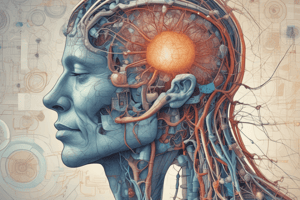Podcast
Questions and Answers
What does a veterinary clinical pathologist do with the results of laboratory analyses?
What does a veterinary clinical pathologist do with the results of laboratory analyses?
- Interpret the results in light of clinical history (correct)
- Perform surgeries on animals
- Conduct field research on animals
- Provide basic care to animals
What is the primary role of a veterinary pathologist in the field of veterinary medicine?
What is the primary role of a veterinary pathologist in the field of veterinary medicine?
- Constructing poultry houses for livestock
- Diagnosing illnesses and injuries in animals (correct)
- Administering medications to sick animals
- Developing veterinary vaccines
Which type of veterinary pathologist evaluates specimens from live animals like blood samples and urine?
Which type of veterinary pathologist evaluates specimens from live animals like blood samples and urine?
- Clinical pathologists (correct)
- Anatomic pathologists
- Veterinary surgeons
- Veterinary radiologists
Which task is typically performed by an anatomic pathologist?
Which task is typically performed by an anatomic pathologist?
What is a key responsibility of a veterinary pathologist regarding health monitoring of livestock, pets, and wildlife?
What is a key responsibility of a veterinary pathologist regarding health monitoring of livestock, pets, and wildlife?
Which profession closely collaborates with a veterinary pathologist to develop effective treatments for animal diseases?
Which profession closely collaborates with a veterinary pathologist to develop effective treatments for animal diseases?
What types of samples are typically evaluated by veterinary clinical pathologists?
What types of samples are typically evaluated by veterinary clinical pathologists?
What is the main difference between clinical pathologists and anatomic pathologists?
What is the main difference between clinical pathologists and anatomic pathologists?
Which type of veterinary professional uses information provided by a clinical pathologist when making treatment decisions?
Which type of veterinary professional uses information provided by a clinical pathologist when making treatment decisions?
What is the primary focus of an anatomic pathologist during autopsy examination?
What is the primary focus of an anatomic pathologist during autopsy examination?
Flashcards are hidden until you start studying
Study Notes
Disease Diagnosis and Treatment
- Accurate disease diagnosis is crucial for effective treatment and management.
- Early treatment of a disease condition greatly influences the outcome.
- Correct diagnosis is essential for administering the correct treatment at the right time and dose.
Prevention of Zoonosis and Public Health
- Zoonosis refers to diseases that can be transmitted from animals to humans.
- Examples of zoonosis include Avian Influenza.
- Veterinarians play a key role in preventing zoonosis and maintaining public health.
- They are responsible for inspecting and certifying meat and eggs for human consumption.
Biomedical Research and Veterinary Medicine
- Biomedical research involves working independently or as part of a team to advance veterinary medicine.
- Veterinarians have a crucial role in biomedical research and medicine.
Clinical Veterinary Surgery
- Veterinary surgery is a branch of therapeutics that corrects or removes defective or diseased body structures in animals.
- It involves manual, instrumental, and operative methods.
- The scope of veterinary surgery includes both therapeutic and non-therapeutic procedures.
- Veterinary surgeons must possess a range of skills, including physical fitness, decision-making ability, and technical skills.
Veterinary Pathology
- Veterinary pathologists play a crucial role in identifying the underlying causes of illnesses and injuries in animals.
- They perform laboratory analyses of tissues, fluids, and other specimens to identify abnormal changes or disease processes.
- There are two types of veterinary pathologists: clinical pathologists and anatomic pathologists.
- Clinical pathologists evaluate specimens from live animals, while anatomic pathologists perform autopsy examinations and biopsies.
Studying That Suits You
Use AI to generate personalized quizzes and flashcards to suit your learning preferences.



